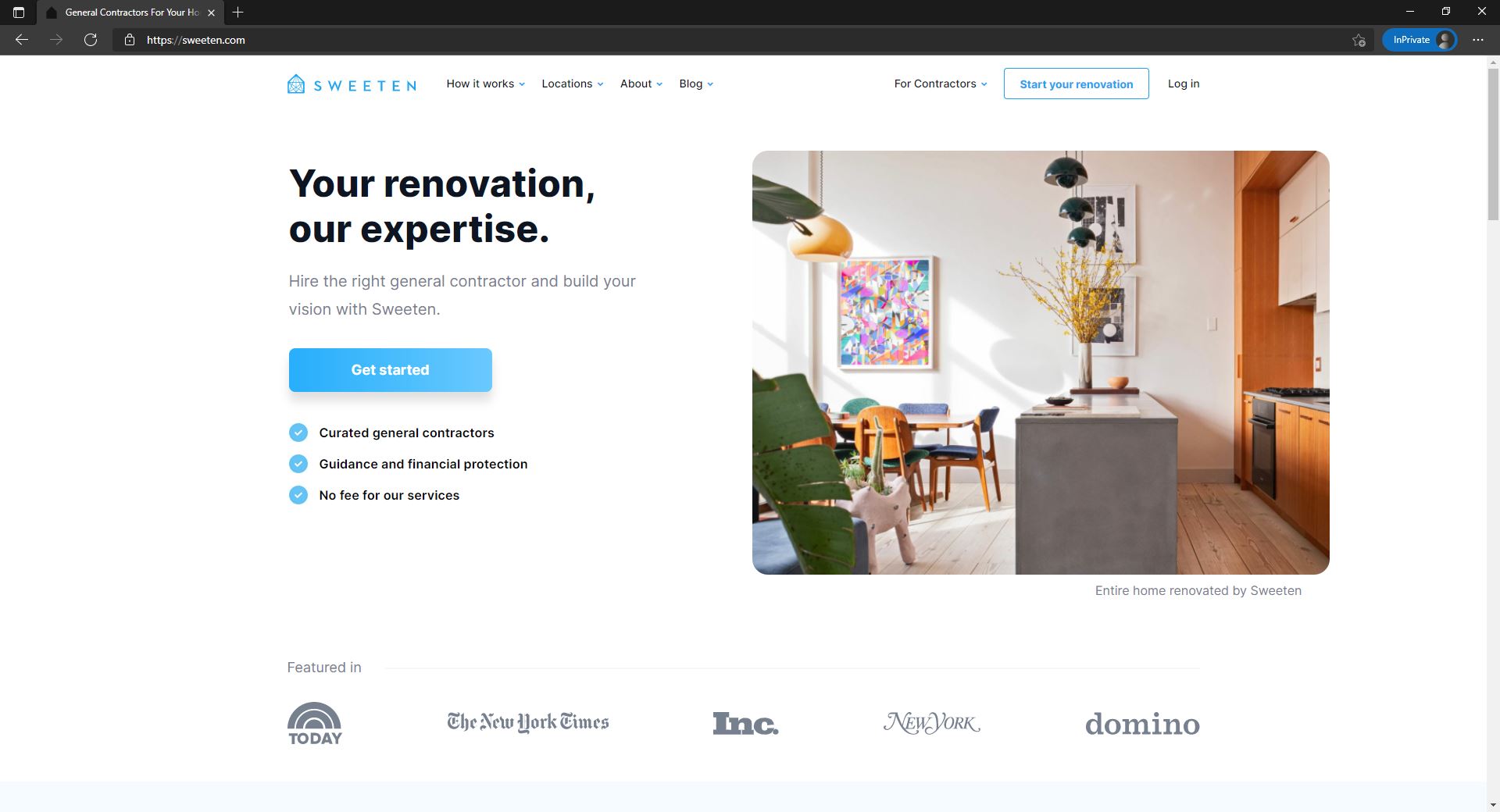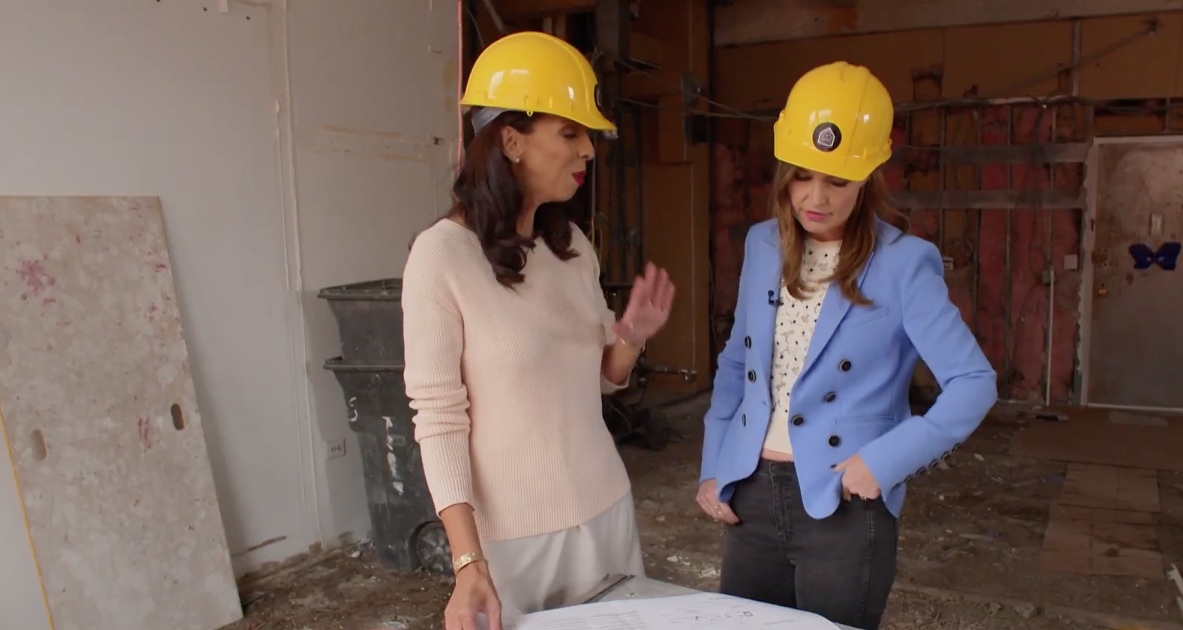Sweeten’s Founder on How Successful Scaling Roots in Shared Principles
Recently in 2019, Jean Brownhill and her team had just raised $7M for her first founding – Sweeten. It is a technology platform that helps homeowners find contractors, in addition to, support, advice and security that a project stays on time as well as within the budget or financial protection for the duration of a project.
Started to gain reputation within the residential space, the company in 2021 running around $1.8B worth of projects in its pipeline, according to CNBC.
How Has It Become a Boom – Sweeten’s Business Model?
2011 is the year the company made its first inception in New York, and since then has not stopped growing. Finally, someone decided to disrupt the daunting and clueless process of hiring and follow-up contractors.
“Many businesses and homeowners don’t know where to start to look for a general contractor for their office build-out and don’t have the knowledge or bandwidth to manage the work once they do hire someone,” Brownhill explains. What she does is to add transparency and high-tech to this traditional market, by matching users’ renovation with their most suited contractors the company helps evaluate the estimates and provides personal support until the project is done.
Besides, the founder claims its platform to be more than just a matchmaker site, it educates owners by walking them through the process to let owners in control of their own renovation, including cost, schedule, expectation – all from its trained architects on staff. On the other hand, it helps to take away many problems for contractors including back-office tasks, like documentation, or customer service, sales, marketing, and deal flow – which offers contractors the time needed to scale their projects by size or amount.
How does it make money? The founder claims their service is completely free, revenues are actually commissions generated from contractors.
However, what is good about this story is not only this business model but also how its founder Jean Brownhill has found this specific niche to successfully made her way into this most male-dominated space.
The Entrepreneurship Journey

Like many others, the ‘A-ha’ moment came to her in a difficult time, yet as a seasoned architect, she did not expect this to happen. Has spent many years in the construction and design industry, Brownhill decided to launch her own home renovation and despite using the same language as these contractors, still, there was a huge gap between what they knew can be done and what she wanted for the end result. “Despite my insider knowledge, I still wound up hiring the wrong general contractor. I imagined how challenging it would be for someone like my aunt or mother,” the founder recalls. That is when she found this ripe niche – even though it started out just to solve a problem, it has become a successful business.
Brownhill flashbacks, at first there was only herself doing all the work. A year later, she had a co-founder on board helps running their blog as a chief marketing strategy. Down the line, finally another architect to join the team makes it a three-people operation – that was when the company successfully raised its first round of venture capital and beginning to scale.
After that, many milestones have been around hiring and bonding teams. About hiring, Brownhill says, if you seek to see a company with a differentiator, you need to fund people with different perspectives – that is how different realities are manifested.
Growing Comfortable into the New Role

In an interview with the Entrepreneur, Brownhill explains how she can finally grow comfortable in her role as a CEO but before that – the stretching out for an architect to fit in this directing role was chaos. And the most fundamental thing that she has learned so far on the definition of an entrepreneur is about ‘undertaking.’
“It is a job that really requires you to enjoy a steep learning curve. And once you accept that, it becomes a lot easier. But, literally, the second you feel like you understand how to do the job and think, ‘Oh cool, I got it.’ It’s like boom. New job.” For clarity, to ace, a steep learning curve is to grow your competency upward or vertically within a limited time – which is very demanding and you will always feel like falling short. However, as Brownhill puts it, that is the constraint that you have to love, and taking pride in insecurity is the only way out. “Then when you make that switch, it’s game on,” she adds.
With a history in the leading role of many large design projects over the course of her career. She found that even though leading a business does have some similarities to leading projects, yet it demands a whole new set of skills, and chief among them is the ability to befriending uncertainty and adapt at a moment’s notice.
Announced to be one of only 26 African-American female founders in the US to raise more than $1M in venture capital, Brownhill claims this is just the beginning since the startup is experiencing its transition into a growth-stage company. And the secret for this relentlessness is the inspiration generated from Sweeten’s ever-changing status.
“My inspiration keeps changing because the job keeps changing. I would say that now I am most inspired just by seeing the light bulb turn on in someone on the team.” The founder explains she is now out of the specific details, the only focus – that might be hard to do – is getting a group of smart people to work together, in alignment, and achieve a shared goal.
Looking back Brownhill recalls one mistake that has made a great impact on her till today – about how she should have listened to her own instincts and had more confidence in her own expertise in the beginning stage of the business. “I tended to defer to people whose resumes were long, but I knew what was right for my business,” the founder explains. Starting a company, there will always be people, especially investors that tell you ‘it’s not going work’ – regardless of how many more meetings you had with them they never going to invest.
A Message to Women Who Are Looking Forward to This Journey

Using technology to disrupt the incredibly male-dominated construction industry, the founder talks on the Refinery about how young women could build careers in this space without being intimidated to be the only woman in the room.
“Okay, this is super tactical, but it’s worked for me: I’ve learned over the years it’s better to simply acknowledge it right away. I tend to use humor,” – what she proposes is to be ‘cool with it, to make a joke about being the only woman there and quickly follow it up with examples of your expertise and why you deserve to be in that room. All of which has helped Brownhill and her team raised millions of dollars for Sweeten, most of which has come from male investors.
On the other hand, the worst advice to tackle this situation is to be somebody else to make a difference. That is something you never do to be successful – it’s a fool’s errand to try and be anyone other than the best version of yourself, she says, because never a pseudo character could make an impact on he or her people, investors, and customers. There are not so many things that have a one hundred percent failure rate, yet pretending to be someone else is one of them.
In brief, what you should do is to be consistent in sharing visions, values as well as vulnerabilities to people. “So, whether I’m talking to my friends, family, or the Sweeten team, I always try to lead with authenticity and integrity.”
Brownhill also mentions how she is developing the Sweeten Accelerator for Women – a program that provides access to more job opportunities and visibility. It is a network that helps boost and develop more women-owned general contracting businesses. According to the founder, this movement would bring to the industry a variety of skills, contributions and especially diversifies clients’ experiences.
Another critical message for entrepreneurs revolves around this quote from Harry Truman – ‘It is amazing what you can accomplish when you do not care who gets the credit.’ As Brownhill puts it, to be committed to the overall score and mission of the vision is what differentiates your business’s spirit – particularly toward leaders, do not focus on your personal seat along the journey. Toward teammates, let them know roles or titles are not their identities at your company but rather the impact they can make on the business and how they present every day as well as respond to situations – is what tells a story about them.
Scaling Is Usually More than What You Think It Is
More from the conversation, Sweeten’s founder shares her experiences in scaling and how does the team take on these challenges.

There is a tendency for most people to embody the concept of scaling a tech startup incorrectly – they think it has something to do with the platform getting sufficient enough to handle more traffic or expanding your brand awareness on the marketplace. However, that is not the hard part.
Indeed, it is more about scaling your value proposition and having it resonate with a lot of people. Because a business is only as good as its people – you cannot make a team works with fragmented vision and weak shared values. Therefore, the point is not to try to expand your presence but rather the meaning of your service, how can you add more value to what you are doing. Something that not only serves customers but your team also takes pride in delivering.
All other technical issues will emerge and show themselves as long as you know how to drive operations with obvious purposes and specific goals. “You will see where the water has broken through and can reinforce that area, instead of spending a bunch of time on the entire dam,” she explains.
In a conversation with Built-in New York, Brownhill mentions her plan on tackling the commercial projects area of her business.
“We were already getting several commercial projects because so many homeowners who’ve used Sweeten are also business owners. So, we started taking on their office spaces, shops, and restaurants.” The company is on its way to formalizing the option and opening up to this space of audience by spending more time building a sufficient general contractor network. Identifying the top 1,000 contractors over 15,000, she says, just like that the business and customers find their way to each other, first on the residential and now commercial – it was very natural.
However, there is quite a challenge to face with this organic method. “We had finished a Brooklyn Heights townhouse and the homeowner would then ask us to build his bar,” the founder continues, yet the problem here is on the tech side – how can they create an entirely new path on the site of commercial projects where they can address the needs of a busy business owner. Knowing it would require a lot of tests and failure to get through, Brownhill right away reaching out to businesses trying to earn their perspectives and expectations. Later down the line, she finally gets there, “It is now super easy for them to come to our site and give us enough info so we can match them with three to five great general contractors who are interested and available to meet them.”
Pivoting in the Pandemic
Even though social distancing was no longer here, businesses within the industry must have suffered a lot. As they all have to make a radical shift, Sweeten is no different. “We know that great players are made in the off-season,” explains Brownhill, “so we began focusing our efforts on things that would set us up for success when demand returned. Resources were shifted and refocused to speed up various platform enhancements that we had begun in 2019.”
So, what it is doing is to look inward and strengthen its system for future growth from project posting experience to a trackable billing system. All-time is an exciting time for business!
The Bottom Lines
What we are seeing is how this on-demand experience was being expected for so long and is now being met – satisfies not only the owners themselves but also contractors that are hungry for tech solutions that can evolve and enhance their business. In brief, transparency is now a must-have item for businesses that expect to thrive amongst others.









